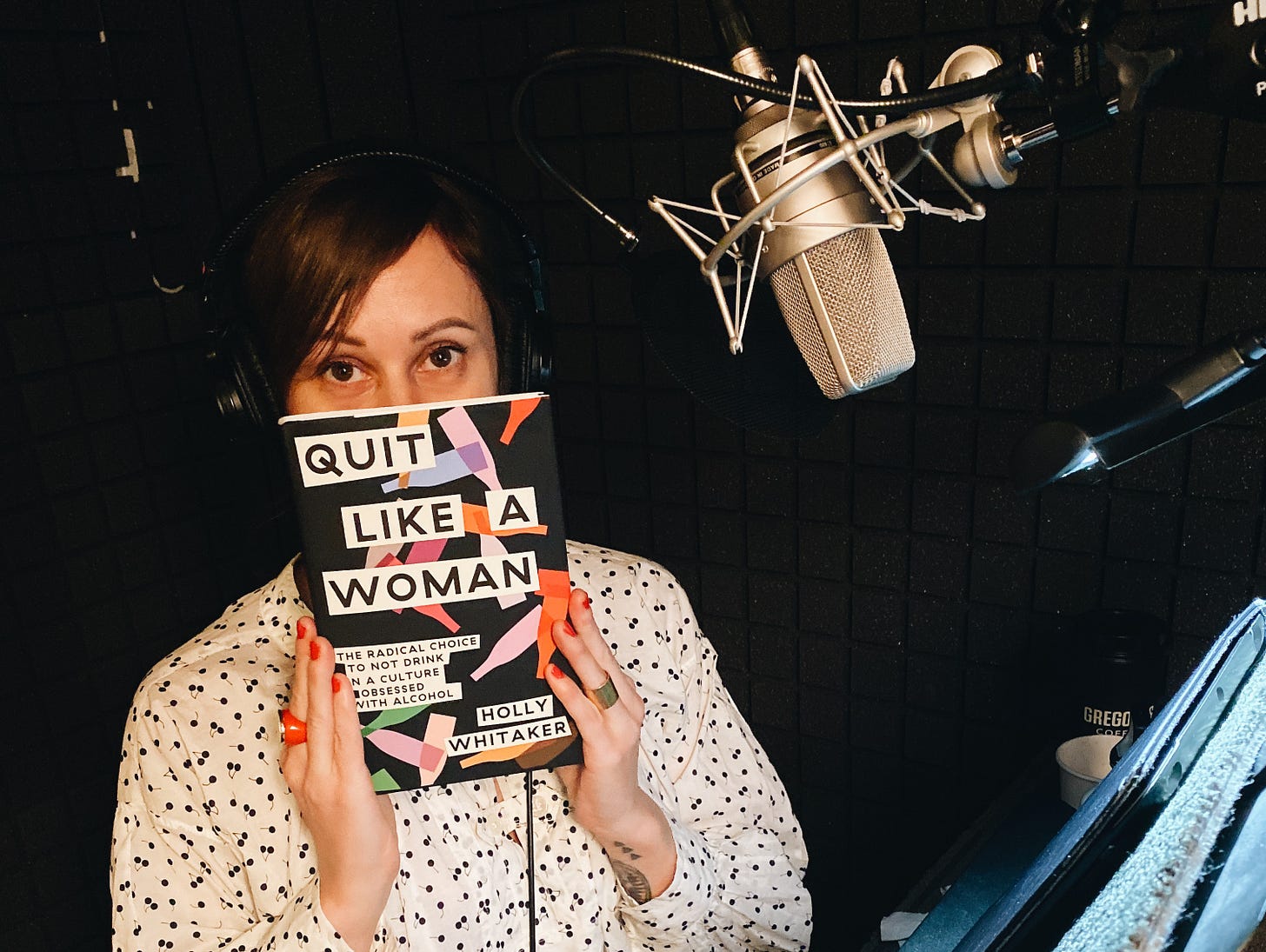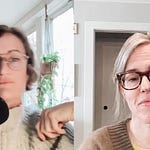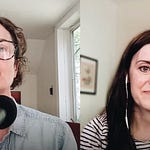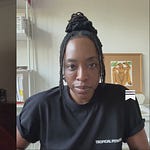Over the years I’ve heard from a number of readers here who didn’t make the connection that I’m also the lady who wrote Quit Like a Woman, so let me start by making that connection for those of you who have not made it, otherwise this might not make sense?1
Anyway, it is a very popular book. It is also very good book, which I know not because I wrote it, but because I read it for the first time two months ago, and when I finished I thought, Damn, that is a good book. I was genuinely surprised because while so many people have thanked me for it, many others have hated me for it too and it’s always the latter ones whose opinions I trust more.
That it was controversial was part of the reason I could not bring myself to read it (and further could not bring myself to write a follow up to it; it’s coming). But also part of the reason I could not read it and could not write a follow up to it is because of what happened to me after publication, which are things that happened to a lot of us, but also things that did not happen to a lot of us.
I lived through a global pandemic and uprising and an insurrection and a second Trump presidency and now fascism or maybe just the plot of Idiocracy. I moved to the woods. I lost my company and my confidence and my purpose and the point of any of it. I got diagnosed with ADHD. I entered perimenopause. I lost more confidence. I got in an earth-shaking fight with my sister that put me on a path to understanding my family system and my role in it as the scapegoat and identified patient and finally extracted myself from my role. I learned about relational trauma, cPTSD, fawning, and narcissistic abuse, which changed a lot of how I saw myself, and who I let into my life, and how I am in the world. I tried psychedelics for therapy. I tried cannabis for fun. I tried letting my grays grow and nixing the Botox. I entered the first healthy relationship of my life. This is not an exhaustive list.
Anyway, the point is that a lot changed and I changed a lot, but the biggest parts of that change were all related to each other (clinical burnout, ADHD/sensory issues, hormones, cPTSD/relational trauma/relational patterns, chronic fawn response)—and they were all related to my recovery.
Over the next few months I’m going to be pulling the thread on these things in a series (including both podcasts and writings) called After Quit Like a Woman: Exploring how neurodivergence, hormones, and cPTSD reshape recovery.
The line-up as of now is as follows. We’ll also be doing chats and threads for each topic to crowd-source your questions and experiences. (We’ll be adding to this if there is continued interest—like vagus nerve/nervous system regulation, narcissistic abuse, IFS for addictions, etc.).
This series is for everyone but espeically for folks who: have trouble making abstinence stick/are white knuckling; feel like their recovery is no longer working; with hormonal fluctuations, neurodivergence, learning/processing differences, cPTSD, relational trauma, etc.
Please note that at least half of this series will be for paid subscribers only (a lot of work went into this series, and it’s extremely vulnerable)—you can access it all by becoming a paid member of this community.
The series starts this week and continues through the end of the year. I would LOVE to hear from you about this below (I always love to hear from you).
After Quit Like a Woman: A Series
We got sober. Then we got our ADHD diagnoses. Here’s what happened next.
How hormones impact drinking, addiction, and recovering
Does recovery retraumatize fawners
Relapse isn’t what you think
Can you moderate alcohol?
Transcript
Hi, you all. This is Holly and this is a short solo episode to set up the series that I have been working on for a while for co-regulation that we are going to be releasing instead of through podcast channels here on my recovery newsletter.
I’m gonna start just a little bit about my experience because really what I’m calling this series is like what came after Quit Like a Woman? And what came after Quit Like a Woman kind of happened before Quit Like a Woman was even published. As soon as the book came out,
In late 2020, or actually two days before it came out, I published a really controversial op-ed in the New York Times. And it was called The Patriarchy of Alcoholics Anonymous. Sorry, The Patriarchy. I was corrected into saying patriarchy years ago, and now I can’t not say patriarchy, but no one I know says patriarchy. The Patriarchy of Alcoholics Anonymous. And.
My book was not highly about alcoholics anonymous. It was about a lot of things, but this was just kind of one of those unfortunate and fortunate choices in that it forever cemented my book as this anti AA book, which it was not. and it also just brought out so much vitriol, as like I, that, that was all directed at me. So pretty much immediately, even before publication, people hated me over this book. I’m a sensitive person.
I am a deeply, deeply sensitive person. And I’ve since learned I’m ADHD and what comes along with that. But it just immediately, the blowback was really, really hard to stomach. I didn’t have a lot of support. I really didn’t have any support at the time. I was the CEO of a company. People that worked for me were not my support system. They were people that worked for me. And that was who I was surrounded by plus
Yeah, I mean, was basically it with some few friends that were really close to me. But it was a lonely time. And I pretty much hated every moment of my book tour just because I was waiting for someone to come out and throw red paint on me or something. And then I’m already in this. then I’m running a company. At the time, that company had like 50 or 60 employees either like waged or.
W2s or contractors, but it was a lot of people that worked there a lot of attention on me a hard company to run anyways Then you know global pandemic I moved from Brooklyn to the woods by myself. I’m the CEO of this company from from the woods during my you know, like my book tour got cut, you know cut early and then and then after that like there’s there’s uprising and the
the amount of dedication that our company had to that was large and that was so much to manage through. And then there was the election and the insurrection. right around February of 2021, well actually in October of 2020, I stopped being the CEO of Tempest. I said I wanted to step down. I went to hire my replacement. I’ve written about this.
and I’ve talked about this on my podcast with Emily McDowell, quitted. pretty like, I hired someone to replace me and as soon as this person walked in the door, they wanted me out. And so, you know, it was the end of a very, very long slog. I was exhausted and I, you know, there’s a lot more nuance here to describe it, but the way that I’ve chosen to describe it is that I was forced out of my own company. And it really, you know, humiliating and...
painful, painful way. And that was just a few weeks after Chrissy Teigen shared on Instagram that my book had saved her life, or not saved her life, helped her quit drinking. So I went between, I had these two competing things happening. My life is, I am at the end of my marathon. I am done. My hair is falling out. I am living in the woods by myself.
My company, it’s just been one thing after the other after the other. And then I hire this person to make it easier and this person kind of guns for me. And then, you know, like as, as I am blowing up in culture, right. And so I’m, I’m on Good Morning America and the Tamron Hall show and giving talks for the Wall Street Journal, Future of Sobriety. And I’m getting canceled at my work by this new CEO. And for, and just like clusterfuck, right.
And if you’ve been following my work for a while, just never came back around for me. So I was in this stage where I’d lost all my structures, like all of us did. I was in this period of time where I didn’t have purpose or meaning. I was really beat up at the end of all of this. And then I just was like, something’s wrong. And that something is wrong was really, really with me. And it was probably late 2022 where I was at, not late, it was actually
summer 2022. No, maybe it was fall. Anyway, I went out with a friend and she had been recently diagnosed as ADHD and she was kind of in a CEO type position. And I said the same thing. I like everyone has that, you know, and the same thing that many people say to me now. It’s not real. I had always known I had it quote unquote, you know, that I was hyper or whatever. But this person was just like,
It is no one doesn’t know. No, not everyone has it. This is a thing. You need to go get tested and diagnosed. And I did. And I had it, which I knew. And then I just for me was like another thing that I just didn’t have the strength to reach. I was so done at that point. It was like I was you know, I’ve written about this. This is the part where I’m passively suicidal. Just means you don’t want to live. But you know, you wouldn’t mind being, you know, killed off, but you’re not going to do it yourself. And
So I think the ADHD diagnosis just kind of sat on the shelf for a while. And I slowly started to pick through it. At the same time as all of this, starting in 2020, I start losing my hair. Actually, in 2018 and 2019, I lost my hearing in my hair. But that was more stress related. So I didn’t really realize that I kind of slowly enter paramenopause. I have.
I have major hair loss. I have major hormone fluctuation. And also, during this time of my life falling apart and me trying to look for what is it, what is it, what is it, I finally get a different type of therapy. And I start doing parts work and somatic experiencing. And in that, I really, really understand. I’m the scapegoat in my family.
I have massive CPTSD and relational trauma. you know, all of this stuff is related. And then in there, I start using cannabis again, which is its whole other experience. And, you know, so in this period of time, right, like this is a lot, it’s kind of hard to shape, which is why the book I’m about it has taken a really long time, but there’s so much happening and yet, and yet all this stuff is fucking related.
All of it. So if you stand back of what I just told you, I had an addiction, I was in recovery, I was sober. Let’s go next to ADHD. We know that undiagnosed, untreated ADHD pretty much turns into addiction. There are studies that show about 40 % of populations in recovery settings have undiagnosed, untreated, not treated, or diagnosed, untreated, undiagnosed neurodivert ADHD.
We know there’s a high correlation with addiction and dyslexia. We know there’s a high correlation with addiction and autism. These things have to do with so many things. The dopaminergic system, it has to do with our stress levels. It has to do with the way we sue. It has to do with our coping mechanisms. But it also has to do with our nervous system and our nervous system management. And then you go to hormones. Well, ADHD and hormones are related.
taking birth control pills can regulate ADHD for an adolescent girl. Me taking hormones in paramanopause regulated my ADHD. It also helped me with my addictive tendencies. And then a relapse, a relapse happens because of nervous system dysregulation. A relapse happens because of not having effective coping mechanisms. CPTSD, oftentimes.
is something that is at the root of all of this, is separate from nervous system regulation, but is not separate from nervous system regulation. And so you kind of see like, it’s almost, I’m not doing this justice, but there’s a lot of layers here, a lot of overlap. so for me, know, Quit Like a Woman, everything I wrote in that book, I recently reread it. I had never read it since I published it. It was too hard.
And that’s, write about that in the book that I’m working on. But I recently moved from Random House to a different publishing house. And in that move, I, with my new editor, read my old stuff. And it was the first time I’d read Quit Like a Woman since it was published. It’s an incredible book. Like, I’m not saying that to toot my own horn. I had a really hard experience with that book. I just, it was like having, I don’t know how to explain it. It’s just too painful. And so I didn’t really.
love that book. I never felt love like, I mean, I love what that book has done for people. I love that that book exists. I did not like it for a while. It was too painful. And I recently read it. It’s an incredible book. Like I was very impressed with it. And not only that, it really holds up. It actually, like I had these fears that like so much had changed. And when I read it, I was like, fuck, shit has not changed. So
Quit Like a Woman is an incredible book that was written by a woman in her 30s who had not yet encountered paramenopause or major hormonal fluctuations and who did not know at the time that she had ADHD. And so in the last five years, just kind of in my own collective grief and pain and transformation and these different diagnoses and these different realizations and reevaluations,
there’s some new information that I have to share and new information that I want to explore and thus this series. And so I’m just gonna leave it there. Like a lot of this stuff, I wanna like one thing I wanna say, you know, I am writing a book on relapse as I’ve already mentioned. don’t like the, I don’t think that’s a pejorative thing. I don’t also necessarily use that word to describe my own experience.
It’s just a universal term that explains a phenomenon a lot of us understand, but relapse can be defined, like if you look it up there’s this paper called 50 Ways to Fall Off the Wagon. And there’s no universal definition for relapse. It can mean literally like having a tincture that accidentally had alcohol and you relapse, gotta reset your day count all the way up to.
You gotta be drinking for a long time or be doing drugs for a long time again before we really count it as a rel- Like there’s so many different definitions. So I’m using it here just to indicate the experience of being in recovery or being sober and using a substance again after you have made some changes with it, which is something that happens to, I think it’s 85 % of people. And so again, I’m gonna leave it there. I wanted to set it up kind of with my story and my narrative, but what we have coming up, I’m kicking this off with a conversation I have.
with Kerry Wilkins, this conversation ends up just being about moderation and relapse. And then after that, I will be having conversations about the FON response. I’ve already had two conversations with Meg Josephson. You can find that under the co-regulation podcast. But I’m going to be going forward having more conversations about relational trauma, the FON response, relapse, and neurodivergence, and then hormones. There’s so many of them. I always forget to.
say all of them and I probably just repeated some of them. And so this is going to be probably like a seven, eight, nine part series that I’m going to be picking at and exploring over the next few months as I work to finish the book that I am working on. The next conversation will be released on October, I think it’s October 16th. We’re going to try and release these on a specific day. But I’m going to be dripping them over a few months.
there will be a lot of different content in between. And so this is not just the only thing that’s gonna be on this newsletter going forward, but this is a series that we have been pulling together that I’m really excited. It’s again, not meant to like draw any conclusions, but really just meant to account for things that don’t get accounted for in our existing understanding of addiction. I mean, this is like, it is wild to me that it is 2025 and we know what we know and yet we don’t know things like.
you know, let’s just talk about hormones. Well, there’s a relapse day. Did you know that? There is a day that folks who are in recovery in that cycle relapse more than others. There’s also windows in our cycle that are better to start quitting something. And so we don’t want to quit during our luteal phase. We want to quit when we’re feeling juicy and good and on top of the world. And so there’s a better quit date.
and based on our hormones. It’s just one thing. Another thing that became so powerfully apparent to me is that a lot of my behaviors were stimming. I have ADHD. This is a very well-known thing. But when you look through most of the literature that exists on addiction and recovery, you’re not finding this stuff about hormones. You’re not finding this stuff about autism. You’re not finding this stuff about ADHD.
And you’re also not really finding stuff about relapse. Relapse is this other thing. Happens to most people that go through some type of abstinence-based recovery or even harm reduction. And yet, it’s something that we don’t talk about or know about. And all these things are deeply related. And knowing about them helps us to be healthier and to have easier recoveries and to make better decisions for ourselves and to have greater success.
on this side of things, knowing what I know about myself now, it wouldn’t change what I put in Quit Like a Woman. Like everything that I needed in my recovery, I needed in my recovery. But after going through what I’ve gone through and being exposed to what I have been exposed to and what I know now and experiencing the benefit I have received from that knowledge,
and then doing something with that knowledge is night and day. Even though I had a very strong recovery prior to knowing all of this, there were massive holes in it because of these things. And they’re not there now. Now it’s a whole picture. And so this is not meant to fix you or solve you or give you all the information, but really it’s just me inviting you along.
into some of the places that I have been poking around so that hopefully you can find some keys for yourself. And I am really excited to do it. It’s been a long few years. think that enough of you have been here through a lot with me. I’ve written through a lot of this in recovering. I’ve written through a lot of this experience. And I am now...
in a really good place. I’m healthier than I’ve ever been, but not necessarily physiologically or mentally. when I say healthier, I mean I’m more rooted, I’m more grounded. It’s sustainable. It feels good. My life feels good. I would say the biggest difference is that before it really felt like keeping balls in the air.
On this side of it, it more feels like just maintaining in a kind of lovely way. So I’ll leave it at that. Thank you so much for listening. I deeply appreciate you being here. And I hope that this is a benefit to you.
I realize there may also be folks here who don’t know what tf QLAW is: It’s a book about quitting drinking and sobriety that has sold many copies and done very well, mostly thanks to Sex and the City and Chrissy Teigen.













